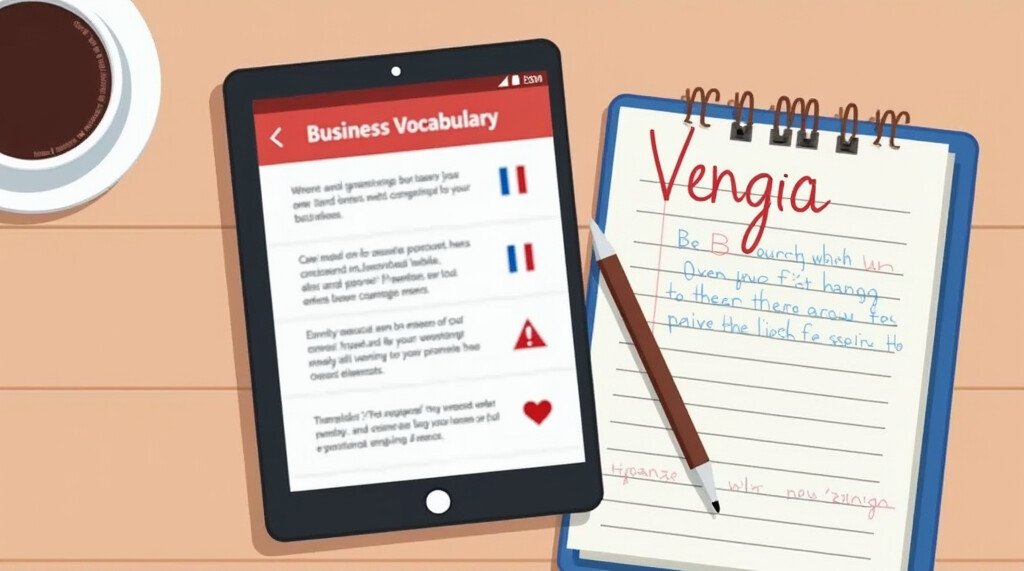 Business language apps often promise quick progress, handy vocabulary drills, and an easy way to start speaking a new language. When I began using these tools to brush up on my work-related French, I made one big mistake: I skipped real conversation practice.
Business language apps often promise quick progress, handy vocabulary drills, and an easy way to start speaking a new language. When I began using these tools to brush up on my work-related French, I made one big mistake: I skipped real conversation practice.
Instead, I focused on flashcards, fill-in-the-blank exercises, and memorizing business phrases. At first, it felt like progress. But when I tried to join real meetings or chat with colleagues, I froze. I realised that checking off app lessons didn’t prepare me for live conversations. That experience taught me something important: to truly improve your business language skills, you must go beyond apps and step into real conversations—even if it feels intimidating.
Why Real Conversation Is Essential for Business Language Learning
Language apps create a safe, predictable routine. They offer short lessons and give you that satisfying feeling of making progress. But when I entered real-life meetings, my confidence dropped. Why? Because business communication is dynamic. It involves:
- Listening and reacting in real time
- Dealing with interruptions
- Asking and answering spontaneous questions
- Understanding tone and cultural differences
Apps don’t teach you how to respond when someone changes the subject, asks for clarification, or uses informal slang. Real conversations give you that flexibility. Over time, talking with others helped me get comfortable with workplace vocabulary, acronyms, and common phrases—things I never saw in an app.
Common Mistakes Learners Make with Language Apps
Many professionals I know make the same mistakes when learning with apps. These are some of the most common:
- Relying too much on fill-in-the-blank exercises
These are helpful for grammar patterns, but they don’t prepare you for fast, real conversation. - Focusing only on vocabulary lists
Flashcards build memory, but they lack context. I knew many words but struggled to form complete, natural sentences. - Avoiding speaking out loud
Feeling shy or self-conscious stops many learners from speaking. If you never say the words, you won’t build confidence. - Skipping listening practice
Apps are often focused on reading and writing. Without listening, it’s hard to understand natural conversations in meetings or calls.
Tip: For a deeper look at these mistakes, FluentU has a helpful article on common language learning pitfalls.
What Language Apps Can (and Can’t) Do for Business Communication
Business language apps are useful. They are:
- Convenient and flexible
- Great for short, daily practice
- Helpful for reviewing vocabulary and polite phrases
- Motivating, especially with progress tracking
But apps have clear limits, especially for professionals:
- They rarely teach cultural communication styles
- They don’t prepare you for background noise, different accents, or fast speech
- They don’t simulate the pressure or unpredictability of real conversations
For example, I never learned how to politely interrupt someone on a video call—or how formal to be in a business email—just by using an app.
Further reading: The British Council outlines the limitations of relying too much on language apps.
How to Add Real Conversation to Your Learning Routine
Here’s what made a real difference in my own progress: I added live speaking practice. Even 15 minutes a week helped.
Some of the most effective methods include:
- Partnering with a language exchange buddy
Many apps and websites help you connect with someone learning your language. Talk about simple topics—like projects or deadlines—and build from there. - Joining online conversation groups
Search for virtual meetups or business-themed language groups. Listening to others and speaking at your own pace is great practice. - Booking sessions with a tutor
Sites like iTalki or Preply offer business English coaches who give personalised feedback. - Volunteering for “low-stakes” language tasks
I started writing follow-up emails or giving summaries after English-language meetings. This gave me real, useful practice.
Start small. Talk about project updates, schedules, or introductions. As your confidence grows, move to more complex discussions.
Choosing the Best AI Conversation App for Business Language Practice
AI is now helping language learners practise real conversations. I’ve tested a few apps, and these features helped most:
- Real-time speech feedback
- Business-focused role-play (like interviews or meetings)
- Tools to track your speaking time and review progress
Here are some top picks:
- HelloTalk – Connects you with native speakers for text, audio, or video chats
- iTalki – Helps you find tutors who offer personalised business language lessons
- Speak – Uses AI to simulate business conversations and offers feedback on your performance
- Private lessons: Focused on your personal needs – we provide these – contact us for a FREE chat here
Tip: AI apps are great, but they’re not perfect. Combine them with real speaking practice for the best results.
Is It Okay to Make Mistakes in Business English?
Yes—completely. Mistakes are part of the process.
At first, I was afraid of saying the wrong thing in meetings. But I learned that:
- Colleagues usually appreciate your effort
- Errors (like using the wrong word or tense) are normal
- Feedback helps you improve faster
Being open to correction is key. Mistakes improve your listening, your fluency, and your confidence. Every error is a small step forward.
FAQs About Business Language Learning
Q: What’s the best conversation app for business English?
A: For real people, try HelloTalk or iTalki. For AI simulations, Speak is great. Choose based on your learning style. Try us too https://calendly.com/englishspeakingprofessionals/english-learning-space
Q: What are common mistakes learners make?
A: Overusing flashcards, skipping speaking practice, not listening enough, and avoiding real conversations.
Q: What are the downsides of language apps?
A: They don’t offer live conversation, cultural context, or natural speech patterns. They are helpful—but not complete.
Q: Is it okay to make mistakes?
A: Absolutely. Mistakes are necessary for growth. Consistent practice and feedback will lead to real progress.
Final Thoughts: Blend Apps and Real Conversations for Faster Progress
Combining language apps with real conversation helped me move from memorising vocabulary to confidently participating in meetings and sending emails at work. Even just 10–15 minutes of live speaking practice a week can build fluency much faster than app drills alone.
Bottom line:
Use apps for structure. Use conversation for progress.
Together, they’ll help you build true confidence in business communication.
